Imran Omer's Blog
October 20, 2020
The Power of Cinema
Stories have always been there to teach us, to entice us to pay attention to new ideas, but the way they have lured us into their environment since the inception of cinema is unique. In the past stories were on sidelines, whereas the religious text was at the center and therefore, at the core of moral values. Now, it seems that the order has reversed and stories through vivid cinema and well-made television series are at the center of life. We drive most of our morals through films. News may or may not inform us, but stories in cinema and television change our moral compass and shape our lives every day. You think this is far-fetched? Listen carefully to children when they talk about a protagonist they had seen on television. Besides the excitement of the plot, they are deducing a lesson which is evident in what they say, but sometimes it is clearer in what they are avoiding to say. Of course, neither children nor adults talk about specific lessons they have learned after watching a program, but the way they talk about the story show what lesson has been conveyed.

Dexter was a favorite of thousands of people on the planet. They felt sympathy to the main character, Dexter, a serial killer with a moral compass. Some even loved him. Is this a new morality evolving at the dawn of 21st century? Or is it an old one in a new form? Have we arrived at the lesson that evil can be used for good, or in more layman terms, that psychopaths can be useful to society? In The Sopranos, we came to know intimately a drug mafia man. We came to know him as a person and even felt sympathetic to him because of his vulnerabilities, and felt sad when in the end he was ambushed. Is it a new moral inclination? We have begun to see life in grey; its not black and white anymore. The religious morals that have a tendency to be in black and white are losing their grip on us, and grey reality is becoming part of our lives. Is it beneficial for us as a people? I guess time will tell.
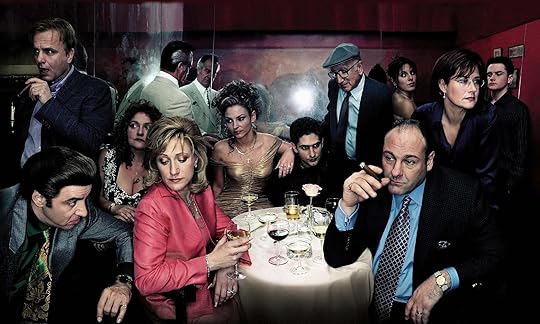
For the sake of this blog, I asked a couple friends the following questions. “What was the morality of Dexter?” One of the answers was: “Even evil can serve humanity.” And, “Duel morality and dichotomy where revenge is proven positive.” These are very complex deductions. Deductions that are only possible in modern times. The second question was: “What was the lesson in The Sopranos? “ One answer was, “Even the worst people have humanity in their roots.” And, “Evil begets evil, but evil is human too.”
Modern story telling has kicked our imagination into directions that we had not explored even fifty years back. Modern story telling is constantly changing our perception about past historical and civic moments. These stories create their own reality of the past. Often these period dramas change our perception about norms, trends and even political events of the past both recent and ancient. Queen Elizabeth I has been played by many actresses in different movies with different depictions of her temperament and political maneuverings. None of them may be close to the reality and probably all reflected a glimpse of her times but each of them changes our perception about her and her era. In the past, historians gave specific perspectives to events according to their beliefs and influences of their monarchs and affiliations. Now, movies and TV series do the same but with vivid imagery and strong story lines and dialogues. Would we feel as sympathetic to the plight of native Americans at the arrival of Columbus crew if we had just read it in the annals of history? Or do we feel sad and even horrified when we see them slaughtered by the invaders in a movie? Moving pictures are much more powerful in shaping our minds than the historical accounts. In Mel Gibson’s The Passion of the Christ, the soundtrack and elevated drama made hordes of people to see the movie. Did Gibson redefine those events? I think so. Was he close to reality? He probably was, but through the addition of music and orchestrated dialogues we entered into a new fictional reality far from the truth. The real events can never compete with the spell of a well-made movie.
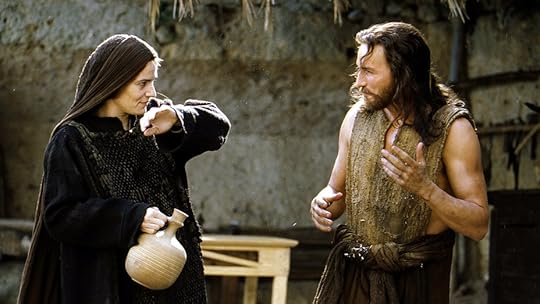
Media, whether it is in the form of news or movies, has a powerful impact on our minds. This facet of our lives can be used for entertainment, enragement, and propaganda. Propaganda can be used to propagate fascism. And therefore, the ability to question information has a significant role in keeping us safe and mentally sound.

Dexter was a favorite of thousands of people on the planet. They felt sympathy to the main character, Dexter, a serial killer with a moral compass. Some even loved him. Is this a new morality evolving at the dawn of 21st century? Or is it an old one in a new form? Have we arrived at the lesson that evil can be used for good, or in more layman terms, that psychopaths can be useful to society? In The Sopranos, we came to know intimately a drug mafia man. We came to know him as a person and even felt sympathetic to him because of his vulnerabilities, and felt sad when in the end he was ambushed. Is it a new moral inclination? We have begun to see life in grey; its not black and white anymore. The religious morals that have a tendency to be in black and white are losing their grip on us, and grey reality is becoming part of our lives. Is it beneficial for us as a people? I guess time will tell.

For the sake of this blog, I asked a couple friends the following questions. “What was the morality of Dexter?” One of the answers was: “Even evil can serve humanity.” And, “Duel morality and dichotomy where revenge is proven positive.” These are very complex deductions. Deductions that are only possible in modern times. The second question was: “What was the lesson in The Sopranos? “ One answer was, “Even the worst people have humanity in their roots.” And, “Evil begets evil, but evil is human too.”
Modern story telling has kicked our imagination into directions that we had not explored even fifty years back. Modern story telling is constantly changing our perception about past historical and civic moments. These stories create their own reality of the past. Often these period dramas change our perception about norms, trends and even political events of the past both recent and ancient. Queen Elizabeth I has been played by many actresses in different movies with different depictions of her temperament and political maneuverings. None of them may be close to the reality and probably all reflected a glimpse of her times but each of them changes our perception about her and her era. In the past, historians gave specific perspectives to events according to their beliefs and influences of their monarchs and affiliations. Now, movies and TV series do the same but with vivid imagery and strong story lines and dialogues. Would we feel as sympathetic to the plight of native Americans at the arrival of Columbus crew if we had just read it in the annals of history? Or do we feel sad and even horrified when we see them slaughtered by the invaders in a movie? Moving pictures are much more powerful in shaping our minds than the historical accounts. In Mel Gibson’s The Passion of the Christ, the soundtrack and elevated drama made hordes of people to see the movie. Did Gibson redefine those events? I think so. Was he close to reality? He probably was, but through the addition of music and orchestrated dialogues we entered into a new fictional reality far from the truth. The real events can never compete with the spell of a well-made movie.

Media, whether it is in the form of news or movies, has a powerful impact on our minds. This facet of our lives can be used for entertainment, enragement, and propaganda. Propaganda can be used to propagate fascism. And therefore, the ability to question information has a significant role in keeping us safe and mentally sound.
Published on October 20, 2020 05:47
October 12, 2020
Effects of Pandemic on Our Students
As a teacher, what is weighing on me about the current situation is the fact that students in almost all the developed countries are going to school, while we are still online. Online teaching is an alternative, but not a substitute, for in-person learning. In-person teaching is like a hare, fast and agile, whereas online teaching is a tortoise. He may win in the story, but in reality, his pace is making its audience bored to death.
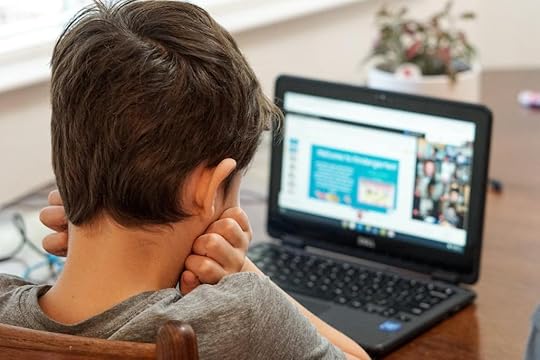
More than the struggles of online teaching, I am worried about the psychological impact on our students, particularly elementary and middle-school students. Schools are not only for learning, they also teach social norms. They teach civil discourse. They teach resilience in ways other than participation in sports and extra-curricular activities. They help us to find our place and decide about our future. They teach kids to discover who they want to be and not just focus on what they need to do to achieve financial success in their lives. All these avenues have been suspended for our young people. So it’s not just the loss of academic opportunities, but it is also a loss of growth in character.
Humans are social animals. It has been researched extensively and concluded repeatedly that socialization is a fertile ground for learning, particularly for children at the elementary level. Our children don’t have access to it the way it helps them the most, in a physical classroom. This lack of social interaction has also brought forth depression and anxiety in our young people. In all my classes, students have asked me more than once in the last three weeks about getting back to school. “Is it ever going to happen?” “When?” “Are we going to be on Zoom for the rest of the year?” These anxieties are very different from the anxieties of failing in a subject, falling behind, or hating math. These anxieties are heavier and seems to bog our students down.

Many of our students have parents that are themselves anxious either because of the financial loss due to the pandemic or due to isolation from their own working environment and, in many cases, aging parents. These parents have too much on their plate and cannot provide as much emotional support as they would under normal conditions.
The loss of life is sad, but the scars that this pandemic will leave behind on us and our children is a fact that we will have to struggle with for quite a few years. And all this could have been stopped. Or at least could be mitigated by proper actions at the right time. Politicians play many games. But the game of downplaying the impact of the pandemic has caused us the most lives and brought us anxiety, depression and grief. Be safe!

More than the struggles of online teaching, I am worried about the psychological impact on our students, particularly elementary and middle-school students. Schools are not only for learning, they also teach social norms. They teach civil discourse. They teach resilience in ways other than participation in sports and extra-curricular activities. They help us to find our place and decide about our future. They teach kids to discover who they want to be and not just focus on what they need to do to achieve financial success in their lives. All these avenues have been suspended for our young people. So it’s not just the loss of academic opportunities, but it is also a loss of growth in character.
Humans are social animals. It has been researched extensively and concluded repeatedly that socialization is a fertile ground for learning, particularly for children at the elementary level. Our children don’t have access to it the way it helps them the most, in a physical classroom. This lack of social interaction has also brought forth depression and anxiety in our young people. In all my classes, students have asked me more than once in the last three weeks about getting back to school. “Is it ever going to happen?” “When?” “Are we going to be on Zoom for the rest of the year?” These anxieties are very different from the anxieties of failing in a subject, falling behind, or hating math. These anxieties are heavier and seems to bog our students down.

Many of our students have parents that are themselves anxious either because of the financial loss due to the pandemic or due to isolation from their own working environment and, in many cases, aging parents. These parents have too much on their plate and cannot provide as much emotional support as they would under normal conditions.
The loss of life is sad, but the scars that this pandemic will leave behind on us and our children is a fact that we will have to struggle with for quite a few years. And all this could have been stopped. Or at least could be mitigated by proper actions at the right time. Politicians play many games. But the game of downplaying the impact of the pandemic has caused us the most lives and brought us anxiety, depression and grief. Be safe!
Published on October 12, 2020 08:05
July 26, 2020
American Spirit!
American Spirit! We were so proud of it, and rightfully so. Traditionally, when we said “American Spirit,” we meant to say that our people, despite our chaotic history, survived, thrived and found new grounds for co-operation within the society. I have deliberately used the past tense because this American Spirit seems to be lost. After this loss, division is penetrating our politics and society like leaches in the veins of a patient in 17th century. The present scenario is incapable of reviving the American Spirit in this time of grave danger that challenges our people. Vested interests and lack of leadership are destroying whatever is left of this spirit, making it harder for people to align themselves with the true goals of the nation. The simple act of wearing a mask has been turned into a polarization in which we are losing our respect for life. It is not only because of the CO-VID pandemic, it’s also a pandemic of ignorance and division.
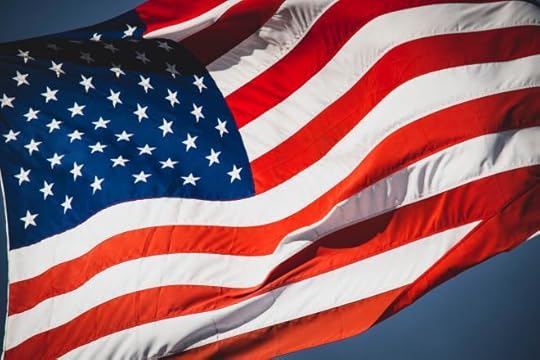
Throughout our history, there have been times when people came forward and met the needs of challenging time willingly and diligently. During WWII, people followed the directions to ration gasoline, butter, canned milk and sugar. Our grandparents and parents accepted the appeal of the government to dress warmly in order to spare fuel for military services. President Roosevelt also asked them to contribute old tires, rubber and shoes to build equipment needed to fight the war, because the rubber plantations in Asia were under enemy control. Young women were encouraged to become war-time nurses and factory workers. During the depression, FDR started many projects to improve infrastructure with the goal of providing jobs to the millions of unemployed citizens and enable them to put food on the table and a roof over the heads of their families. This is a stark contrast to the current situation, in which corporations, air lines, and big businesses with influence got the largest chunk of CO-VID relief funds.

Are we ready to come together again and face the predicament in front of us? We all know that the answer is in the negative. Is it because we have lost touch with reality? Is the new generation not capable of tackling the new challenges? Or are we just too self-centered and more interested in taking sides than finding a common solution? Is the twenty-four-hour news-cycle to blame? I think all these questions lead to a more significant one: Who are we? It’s time to redefine ourselves with clarity and responsibility, because without this, our future may remain murky.

Throughout our history, there have been times when people came forward and met the needs of challenging time willingly and diligently. During WWII, people followed the directions to ration gasoline, butter, canned milk and sugar. Our grandparents and parents accepted the appeal of the government to dress warmly in order to spare fuel for military services. President Roosevelt also asked them to contribute old tires, rubber and shoes to build equipment needed to fight the war, because the rubber plantations in Asia were under enemy control. Young women were encouraged to become war-time nurses and factory workers. During the depression, FDR started many projects to improve infrastructure with the goal of providing jobs to the millions of unemployed citizens and enable them to put food on the table and a roof over the heads of their families. This is a stark contrast to the current situation, in which corporations, air lines, and big businesses with influence got the largest chunk of CO-VID relief funds.

Are we ready to come together again and face the predicament in front of us? We all know that the answer is in the negative. Is it because we have lost touch with reality? Is the new generation not capable of tackling the new challenges? Or are we just too self-centered and more interested in taking sides than finding a common solution? Is the twenty-four-hour news-cycle to blame? I think all these questions lead to a more significant one: Who are we? It’s time to redefine ourselves with clarity and responsibility, because without this, our future may remain murky.
Published on July 26, 2020 14:20
June 30, 2020
Media—Frenzy and Fallacy
Media is important. It may sometimes be biased but it is not fake, and it is a beacon that throws light onto the corrupt political systems. It shines a light on the frustrations and misfortunes of our society. But it often overlooks our blessings, our aspirations, and our strengths. In the present time, when the news stations have become twenty-four-hour loudspeakers of doom and gloom, their adverse effects on our lives are evident. These loudspeakers in our living rooms often induce frustrations, hopelessness, stress and even depression.

A friend of mine said that you just have to turn the television off and all is quiet. I guess that’s true, but it seems that media is as addictive to many people as nicotine, caffeine and Facebook, and to turn the switch off is not so easy, particularly when our anxieties are at a peak because of lock-downs, racial discrimination and social injustice.
Even during times when life has fewer waves, media hinders our inward focus and draws us out to look at the problems in the country and around the world. Do we need to know about these problems? Sure. Do we need to be reminded about them every hour? No.
So, what is the solution? What if we combine MSNBC or CNN with the History Channel, the Science Channel, and Animal World? You might laugh at me but think about it for a moment. We need to know about life and our place on this planet as a human species as much as we need to know about our political system. Maybe more so, as life and history have many more lessons to offer than politics, at least now-a-days.
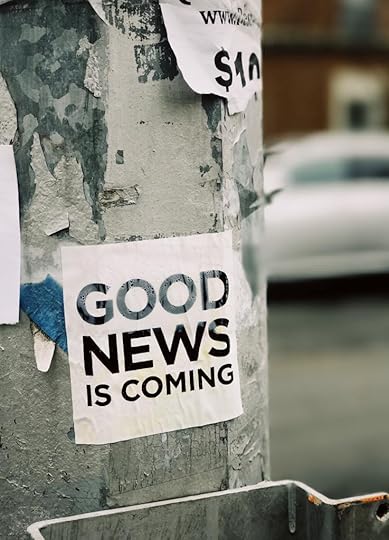
I would like to see media shifting its focus from all-politics to all-society, because politics is just one step to shape society for the good of the people but is not the only game available in our lives. Instead of spurts of news about education and a few disparate discussions, why not have an ongoing dialogue to raise its standards? Instead of just talking about poverty and racial discrimination, how about a panel that constantly investigates their implications, effects and solutions? We have seen American Idol for many seasons, how about one season of this panel? (Nothing against American idol though. I guess It can be telecasted in-between the discussion about education and panel investigating poverty). But I am naïve to think that this would ever happen because all the channels are under the spell of ratings and profit. I guess it can happen only in an environment in which a government channel operates as an underpinning for a welfare state. A channel that is not worried about ratings but quality and dialogue among people who are bringing different perspectives to the table. A diversity in views.

A friend of mine said that you just have to turn the television off and all is quiet. I guess that’s true, but it seems that media is as addictive to many people as nicotine, caffeine and Facebook, and to turn the switch off is not so easy, particularly when our anxieties are at a peak because of lock-downs, racial discrimination and social injustice.
Even during times when life has fewer waves, media hinders our inward focus and draws us out to look at the problems in the country and around the world. Do we need to know about these problems? Sure. Do we need to be reminded about them every hour? No.
So, what is the solution? What if we combine MSNBC or CNN with the History Channel, the Science Channel, and Animal World? You might laugh at me but think about it for a moment. We need to know about life and our place on this planet as a human species as much as we need to know about our political system. Maybe more so, as life and history have many more lessons to offer than politics, at least now-a-days.

I would like to see media shifting its focus from all-politics to all-society, because politics is just one step to shape society for the good of the people but is not the only game available in our lives. Instead of spurts of news about education and a few disparate discussions, why not have an ongoing dialogue to raise its standards? Instead of just talking about poverty and racial discrimination, how about a panel that constantly investigates their implications, effects and solutions? We have seen American Idol for many seasons, how about one season of this panel? (Nothing against American idol though. I guess It can be telecasted in-between the discussion about education and panel investigating poverty). But I am naïve to think that this would ever happen because all the channels are under the spell of ratings and profit. I guess it can happen only in an environment in which a government channel operates as an underpinning for a welfare state. A channel that is not worried about ratings but quality and dialogue among people who are bringing different perspectives to the table. A diversity in views.
Published on June 30, 2020 18:02
•
Tags:
i-b-media-b-i
June 11, 2020
New Voices
Many new voices that we hear more and more today in politics, business and art and culture were not heard as recently as fifty years back. Colonialism, slavery and economic repression never let these voices surface and come onto the world stage.
Slavery/Colonialism
This is not my attempt to equate slavery and colonialism. Slavery was and is far harsher than any colonial era in history. My intention is to bring all repression due to race/color under one large umbrella.There is a difference in degree, but the repressors have the same goals,in which the greed of the offenders and lack of power-sharing play a big role.
When a group is systematically repressed, its voice is crushed, its history is distorted, and its political and socio-economic freedom is violated. The power is with the colonizer, and as a result, the native culture is portrayed as low, lacking high morals and ideals.
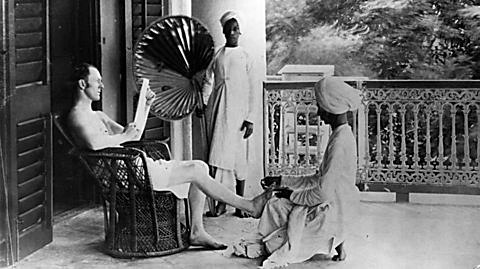
During the colonial era, the powers (whether they were British, Spanish or any other) tried to structure the education of the colonized masses to create good clerks.They kept the modern education for their own children while curbing the new voices. The best example I can think of is the Indian sub-continent where we still see two parallel systems of education. One has English as the medium of education and is equipped with all the resources provided for by private funding.The other has the national or provincial language as the medium of study and is provided with minimum possible resources. The powers, whoever they may be, also divided people by creating a wealthy class of subjects. This elite class was faithful to the rulers for the sake of protecting their new prosperity.
Language and Culture
When your language is repressed or at least forced to take the back seat as happened in Indian sub-continent and other places, your voice is subdued if not completely throttled. Your language is usually not understood beyond your borders.To speak loudly in order to go beyond borders, you are forced to learn the language of the rulers. Command of the new language does not happen in one generation, and if education is not provided or is sub-standard, it does not even happen in a few generations. The time spent in finding a voice in a new language is also the time spent in repression. The colonial forces are actively destroying your world view, creating low self-esteem, pointing at the culture constantly to prove it inferior. Culture is also tied to language. When you give a language a backseat, you undermine its culture too. This means that you inculcate low self-esteem and lack of confidence in the minds of the young generation and encourage them to be the puppets of the oppressors to gain any standing in the society.

Photo by Pavan Gupta
History
History was written by the oppressors. Sometimes, they justified their actions by showcasing the benefits they have brought to the colony and at others by framing the culture of the natives as low and desperate for help. These historians of course wrote in the language of the colonial powers and there were no voices to deny what they were writing.Those who were repressed probably were not even equipped with the tools to use the language of the repressor and rarely had have enough freedom of expression to establish a front.Therefore,they were never heard in mainstream politics and society within their countries and outside.
New Voices
In the first half of the 20th century, a great many people appeared in the repressed societies,using their voices in the language of colonial powers and paved the way for freedom. These voices gave power to their people and their expression of who they were and what were their aspirations. Later, the Internet further expanded the reach of these voices. New voices not only appeared to achieve freedom and defend rights, they also appeared in art and literature, and of course in business, politics and technology. A conservative mind usually finds this power-sharing threatening, as it challenges the status-quo. Our recent history has witnessed unrest in which the colonial/conservative mind unleashed its weapons on more progressive, power-sharing structures and its people.
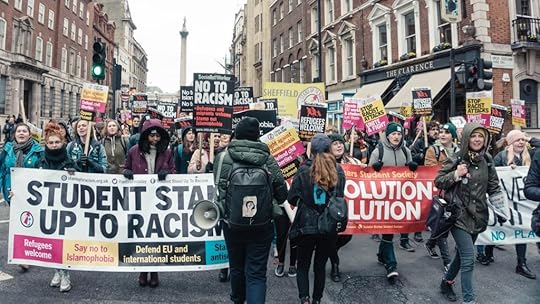
Photo by Yeo Khee
If we want an equitable world, then we need to realize the importance of these new voices. We need to acknowledge them, even celebrate them.Without these voices we are chained to the past and its repression. These voices may have anger and pain, and they may be loud, but they are the voices of strength and valor. These voices can be an asset for a democracy and for a better and equitable future. If the forces, whoever they may be, continue to try to shut them down, they will call for chaos and decline.
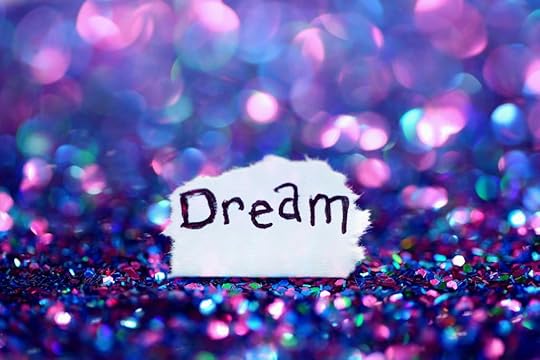
Photo by Sharon McCutcheon
Imran Omer
Slavery/Colonialism
This is not my attempt to equate slavery and colonialism. Slavery was and is far harsher than any colonial era in history. My intention is to bring all repression due to race/color under one large umbrella.There is a difference in degree, but the repressors have the same goals,in which the greed of the offenders and lack of power-sharing play a big role.
When a group is systematically repressed, its voice is crushed, its history is distorted, and its political and socio-economic freedom is violated. The power is with the colonizer, and as a result, the native culture is portrayed as low, lacking high morals and ideals.

During the colonial era, the powers (whether they were British, Spanish or any other) tried to structure the education of the colonized masses to create good clerks.They kept the modern education for their own children while curbing the new voices. The best example I can think of is the Indian sub-continent where we still see two parallel systems of education. One has English as the medium of education and is equipped with all the resources provided for by private funding.The other has the national or provincial language as the medium of study and is provided with minimum possible resources. The powers, whoever they may be, also divided people by creating a wealthy class of subjects. This elite class was faithful to the rulers for the sake of protecting their new prosperity.
Language and Culture
When your language is repressed or at least forced to take the back seat as happened in Indian sub-continent and other places, your voice is subdued if not completely throttled. Your language is usually not understood beyond your borders.To speak loudly in order to go beyond borders, you are forced to learn the language of the rulers. Command of the new language does not happen in one generation, and if education is not provided or is sub-standard, it does not even happen in a few generations. The time spent in finding a voice in a new language is also the time spent in repression. The colonial forces are actively destroying your world view, creating low self-esteem, pointing at the culture constantly to prove it inferior. Culture is also tied to language. When you give a language a backseat, you undermine its culture too. This means that you inculcate low self-esteem and lack of confidence in the minds of the young generation and encourage them to be the puppets of the oppressors to gain any standing in the society.

Photo by Pavan Gupta
History
History was written by the oppressors. Sometimes, they justified their actions by showcasing the benefits they have brought to the colony and at others by framing the culture of the natives as low and desperate for help. These historians of course wrote in the language of the colonial powers and there were no voices to deny what they were writing.Those who were repressed probably were not even equipped with the tools to use the language of the repressor and rarely had have enough freedom of expression to establish a front.Therefore,they were never heard in mainstream politics and society within their countries and outside.
New Voices
In the first half of the 20th century, a great many people appeared in the repressed societies,using their voices in the language of colonial powers and paved the way for freedom. These voices gave power to their people and their expression of who they were and what were their aspirations. Later, the Internet further expanded the reach of these voices. New voices not only appeared to achieve freedom and defend rights, they also appeared in art and literature, and of course in business, politics and technology. A conservative mind usually finds this power-sharing threatening, as it challenges the status-quo. Our recent history has witnessed unrest in which the colonial/conservative mind unleashed its weapons on more progressive, power-sharing structures and its people.

Photo by Yeo Khee
If we want an equitable world, then we need to realize the importance of these new voices. We need to acknowledge them, even celebrate them.Without these voices we are chained to the past and its repression. These voices may have anger and pain, and they may be loud, but they are the voices of strength and valor. These voices can be an asset for a democracy and for a better and equitable future. If the forces, whoever they may be, continue to try to shut them down, they will call for chaos and decline.

Photo by Sharon McCutcheon
Imran Omer
Published on June 11, 2020 18:02
April 11, 2020
Benefits of the Pandemic
There is a lot of focus on what we have lost due to this pandemic, but let’s try to be our own teachers for a moment and look at what we have gained from this catastrophe.
1. We have learned to be resilient. We have come to know what works and what should be avoided if this happens in future.We have come to know that we are vulnerable in the face of nature, but we have also realized that we humans always bounce back.

Photo by Gaetano Cessati
2. We have learned new modes of doing things. I knew that language can be taught online, but I never thought Art could be taught this way until I had to make it possible, and I found new ways of doing it.
3. Proximity to our loved ones in lock-down may have caused disagreements but we have realized how important they are, and their absence would create a vacuum in our lives.
4. We are cooking at home a lot more, trying new recipes.
5. This pandemic has also ingrained in our minds that no matter how much we love the old ways of segregation and division, this globe is one and whatever happens in one place effects the whole world. We are all members of the same human community.
6. And the creativity: In just a few days there are so many Youtube videos on creating masks, so many new sites on online education and new methods on old ones, so much Zooming, Skyping and webinaring to communicate and learn, so many calls to old friends and so many regular calls to parents who have always complained that we don’t communicate enough.
Isn’t all this worth something?
1. We have learned to be resilient. We have come to know what works and what should be avoided if this happens in future.We have come to know that we are vulnerable in the face of nature, but we have also realized that we humans always bounce back.

Photo by Gaetano Cessati
2. We have learned new modes of doing things. I knew that language can be taught online, but I never thought Art could be taught this way until I had to make it possible, and I found new ways of doing it.
3. Proximity to our loved ones in lock-down may have caused disagreements but we have realized how important they are, and their absence would create a vacuum in our lives.
4. We are cooking at home a lot more, trying new recipes.
5. This pandemic has also ingrained in our minds that no matter how much we love the old ways of segregation and division, this globe is one and whatever happens in one place effects the whole world. We are all members of the same human community.
6. And the creativity: In just a few days there are so many Youtube videos on creating masks, so many new sites on online education and new methods on old ones, so much Zooming, Skyping and webinaring to communicate and learn, so many calls to old friends and so many regular calls to parents who have always complained that we don’t communicate enough.
Isn’t all this worth something?
Published on April 11, 2020 16:25
March 25, 2020
My 'Hood
I was the fourth child, a son, born to parents that fought every evening as if it were a ritual without which they couldn't go to bed. My father left us when I was seven. My mother did her best to make ends meet, but it was obvious that three jobs, paying minimum wage, were killing her. When I was twelve, my two older brothers were killed—One by a rival gang and the other by police. The grief soon killed my mother. My elder sister, who had been paying the bills with some help from the state, disappeared a year later. Some says she was a victim of sex trafficking, but I never came to know what had happened to her. There was nobody to pay the bills so I came to live on the streets. Every night, I took the last green train and slept on it; then I went to my 'hood in the morning.
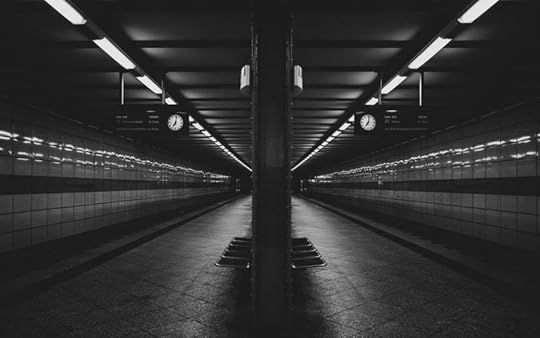
Photo by Paul G
In my 'hood, guns were everywhere. I just needed to find an allegiance with a gang. I joined my brothers' gang. I wanted to kill the ones who had killed my brothers, the gang who was always in conflict with mine. Anyway, I didn't belong anywhere. I had nobody. I needed to be part of something and what could be better than part of revenge?
Once I got a gun in my hand I felt powerful. After all who could not submit to a gun, except…except cops. I knew very well that I had to avoid them at any cost, and I did, for a long time. During that time, I killed the brothers who had killed mine. But then I got caught, which I knew had to happen. I thought my gang would back me up. I was a fool. They all ran away into their ditches—the ones who recruited me, the ones I thought were my brothers and would always be on my side.

Photo by Max Kleinen
I ended up in prison. I knew I'd get thirty to forty years; more years than I had lived outside. And then they told me if I go to school located in the prison, I'd get a day off in my sentence for each day in school. Now, when I was deep into the ditch, they thought of saving me as if a year or two off of my sentence would make a difference, as if they didn't know that I'd be an old man when I'd get out of here. But I accepted. It took me out of the cell, away from the bullies, for a while, but I had little interest in any of the subjects, except Art. Art was a distraction that took my mind off of the past and present, and the dread of the future.
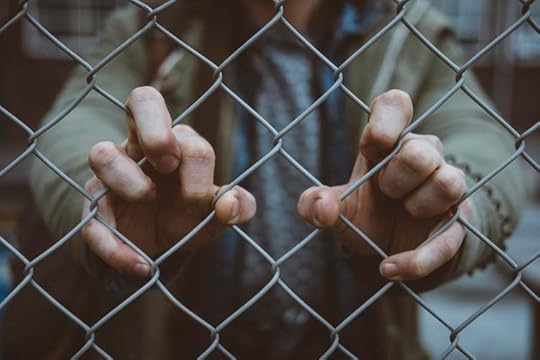
Photo by Mitch Lensink
The above is the composite memoir of the students I taught in a high school, located in the prison system. I call it a composite because I have tried to use a general theme I found in the lives of my students, but there were lives that were way more difficult than this general theme. I really came to know the meaning of the expression, "reality is stranger than fiction."
These young men, who were usually neglected or abused physically and definitely emotionally, found their "belonging" only outside home, with gangs; gangs that thrive on violence; violence that brings these young men to prison, sooner or later. Who is responsible to hand over these weapons to our young men? Gangs? Society? System? Second Amendment?
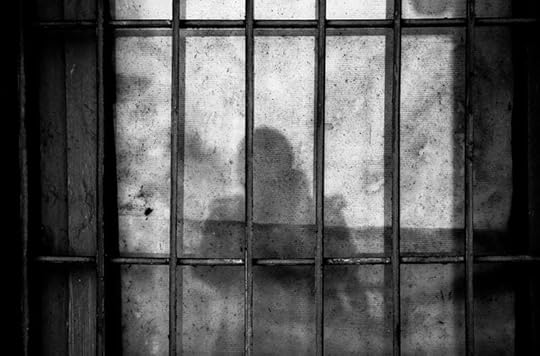
Photo by Ye Jinghan
We live in a society that make parents work two to three jobs to put food on the table and roof over the head of their children. After this neglect at home and in the society in general, we expose our youth to the environment where guns are prevalent and where only chance to feel any power is to be in gangs. These vulnerable young men and women whose cognitive faculties are still incapable of comprehending the effects of life s/he has chosen are forced to make tough choices on the streets. Wouldn't our forefathers consider this while ratifying the second amendment if they could foresee the effects of it on our youth 230 years later? Shouldn't we consider it?

Photo by Paul G
In my 'hood, guns were everywhere. I just needed to find an allegiance with a gang. I joined my brothers' gang. I wanted to kill the ones who had killed my brothers, the gang who was always in conflict with mine. Anyway, I didn't belong anywhere. I had nobody. I needed to be part of something and what could be better than part of revenge?
Once I got a gun in my hand I felt powerful. After all who could not submit to a gun, except…except cops. I knew very well that I had to avoid them at any cost, and I did, for a long time. During that time, I killed the brothers who had killed mine. But then I got caught, which I knew had to happen. I thought my gang would back me up. I was a fool. They all ran away into their ditches—the ones who recruited me, the ones I thought were my brothers and would always be on my side.

Photo by Max Kleinen
I ended up in prison. I knew I'd get thirty to forty years; more years than I had lived outside. And then they told me if I go to school located in the prison, I'd get a day off in my sentence for each day in school. Now, when I was deep into the ditch, they thought of saving me as if a year or two off of my sentence would make a difference, as if they didn't know that I'd be an old man when I'd get out of here. But I accepted. It took me out of the cell, away from the bullies, for a while, but I had little interest in any of the subjects, except Art. Art was a distraction that took my mind off of the past and present, and the dread of the future.

Photo by Mitch Lensink
The above is the composite memoir of the students I taught in a high school, located in the prison system. I call it a composite because I have tried to use a general theme I found in the lives of my students, but there were lives that were way more difficult than this general theme. I really came to know the meaning of the expression, "reality is stranger than fiction."
These young men, who were usually neglected or abused physically and definitely emotionally, found their "belonging" only outside home, with gangs; gangs that thrive on violence; violence that brings these young men to prison, sooner or later. Who is responsible to hand over these weapons to our young men? Gangs? Society? System? Second Amendment?

Photo by Ye Jinghan
We live in a society that make parents work two to three jobs to put food on the table and roof over the head of their children. After this neglect at home and in the society in general, we expose our youth to the environment where guns are prevalent and where only chance to feel any power is to be in gangs. These vulnerable young men and women whose cognitive faculties are still incapable of comprehending the effects of life s/he has chosen are forced to make tough choices on the streets. Wouldn't our forefathers consider this while ratifying the second amendment if they could foresee the effects of it on our youth 230 years later? Shouldn't we consider it?
Published on March 25, 2020 09:18
February 18, 2020
Art and Trade Fairs
Recently I came across the news that Chicago’s Old St. Patrick’s Roman Catholic Church is no longer hosting its World’s Largest Block Party. The 35-year-old, two-day festival of music and food drew thousands of people to the business district where Old St. Patrick’s Church is located.
The pastor, the Rev. Tom Hurley, says that the “summer event environment in Chicago is more competitive than it was 35 years ago and more difficult for the 175-year-old church to navigate.”
I have always had mixed feelings about the art and trade fairs that pop up like mushrooms in Chicago and its suburbs, in fact all over the country, every summer. On one side, I am proud of the tradition and the cultural heritage they offer to their audience,but on the other hand I am frustrated by the overwhelming corporate presence in them. They all look the same and they have lost the local flavor they carried in the past. Around twenty years back, each fair was different than the others, and it represented the neighborhood merchants and artists.
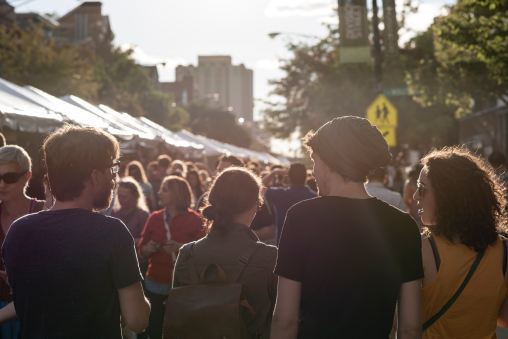
I very well remember that the Halsted Street Market Days started as a way for the local businessmen to attract people to the neighborhood by displaying their goods on the pavements outside their shops.The local businessmen organized and participated in the fair. Another example is the Taylor Street (Little Italy) fair which really had a feel of the neighborhood. Retro on Roscoe has nothing retro anymore, other than some old cars parked in a lot. Now, these fairs are controlled by various corporate bodies like fast-food chains that end up creating the same milieu in their restaurants, except for a change in the décor here or a change in the plan of the restaurant there.
Another aspect of this corporate control is the entrance fee. They use ambiguous language on the tickets to tell the visitors that the fee is not mandatory, but the area is blocked completely, and the fee is more than strongly encouraged. We should not be asked to pay to walk on the streets of our city. I guess a lawyer knows the implications of this better than I, but I find it unreasonable, at the least.
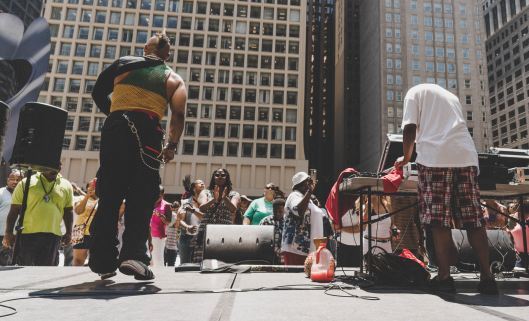
I wish we could get back to the good old fairs that were organized by the local merchants and artists.These local stakeholders were invested in their neighborhoods which benefited from them, instead of some entity that is coming from outside and whose priority is to make as much money as possible from the participants and the visitors.
The pastor, the Rev. Tom Hurley, says that the “summer event environment in Chicago is more competitive than it was 35 years ago and more difficult for the 175-year-old church to navigate.”
I have always had mixed feelings about the art and trade fairs that pop up like mushrooms in Chicago and its suburbs, in fact all over the country, every summer. On one side, I am proud of the tradition and the cultural heritage they offer to their audience,but on the other hand I am frustrated by the overwhelming corporate presence in them. They all look the same and they have lost the local flavor they carried in the past. Around twenty years back, each fair was different than the others, and it represented the neighborhood merchants and artists.

I very well remember that the Halsted Street Market Days started as a way for the local businessmen to attract people to the neighborhood by displaying their goods on the pavements outside their shops.The local businessmen organized and participated in the fair. Another example is the Taylor Street (Little Italy) fair which really had a feel of the neighborhood. Retro on Roscoe has nothing retro anymore, other than some old cars parked in a lot. Now, these fairs are controlled by various corporate bodies like fast-food chains that end up creating the same milieu in their restaurants, except for a change in the décor here or a change in the plan of the restaurant there.
Another aspect of this corporate control is the entrance fee. They use ambiguous language on the tickets to tell the visitors that the fee is not mandatory, but the area is blocked completely, and the fee is more than strongly encouraged. We should not be asked to pay to walk on the streets of our city. I guess a lawyer knows the implications of this better than I, but I find it unreasonable, at the least.

I wish we could get back to the good old fairs that were organized by the local merchants and artists.These local stakeholders were invested in their neighborhoods which benefited from them, instead of some entity that is coming from outside and whose priority is to make as much money as possible from the participants and the visitors.
Published on February 18, 2020 03:15
August 17, 2019
The Future of Our Youth—Hope or Despair?
As a teacher, when I look at our youth, my feelings move from hope to disappointment and then disappointment to hope.
They are intelligent, but mesmerized by technology.
They lack basic skills, but believe that they are special.
They know what is on Facebook, but have little interest in the abstract ideas and deeper questions of life.
They are bright, but do not understand that hard work is as important as intelligence.
They want to leap and have unique ideas, but are too distracted to turn their ideas into reality.

A colleague of mine said that all generations are like this until … until one day life dawns on them and forces them to be pragmatic. I am not so sure about that. Just fifty years back the world was different and so was the generation that breathed in that environment. We did not have cell phones, and the internet was not part of our basic needs. Jobs were ample (at least in the Western world) and a bachelor’s degree was more than enough to move up to the middle class. Now, a master’s degree is often not enough to get a job that can sustain a family of four, even when both parents work. Fifty years back, the minimum wage was a good support system for students and young men and women entering in the job market. Now, the minimum wage provides enough for one person to live on junk food and in the case of a family, you also have to rely on food stamps.

But let us look at the world outside our borders. A large number of Latin American youth is either in gangs or running away from them to save their lives. In India, every month, one million young men and women enter in the job market. And there are millions of them that have work but are underemployed.

China has only been able to control its population explosion by a one-child policy, but that policy is loosening its grip on a society that is proud to call itself communist, yet aspires to all the material benefits of capitalism. Don’t get me wrong, I am not advocating harsh policies to control population growth but increase in population will only multiply the problems we are facing in the world at this moment.
And now, the environment. On regular basis our scientists remind us of the catastrophes we and our future generations may face. When I look at the future, I see young men and women struggling to make ends meet in an economy that is throttled by wildfires, storms and floods. Is this the future of our future? I hope not. I am eagerly looking for a sign of intervention, but it seems that at least at this moment our leadership has decided to put the nation in reverse as far as the environment is concerned.
Let us look at our education system. The Program for International Student Assessment (PISA) is a worldwide study by the Organization for Economic Co-operation and Development intended to evaluate educational systems by measuring 15-year-old school students’ scholastic performance on mathematics, science, and reading. The National Center for Education Statistics writes “In 2015, average scores … ranged from 556 in Singapore to 332 in the Dominican Republic. The U.S. average score was 496. … The U.S. average was lower than 18 education systems, higher than 39, and not measurably different than 12 education systems.” (The last PISA was in 2018 and its results will be announced in December of this year). Looking at the results of 2015, it is pretty obvious that our performance was not good, considering that we are a country which spend a lot more per capita on education than most of the countries that participated in the 2015 PISA. The story does not end here. On one hand a high school degree has little value and a bachelor’s is not enough, on the other hand in order to get a master’s degree and be more marketable, our young men and women have to borrow too much money due to the high rates of tuition and interest, and a rising living cost. As a result they have to defer their lives by not leaving the nest and often by delaying marriage as they are not ready to bear the expenses.
What world we are leaving for the next generation? We have often heard this question in connection with the deteriorating environment. My question is: Are we leaving a planet where the next generation can thrive?

They are intelligent, but mesmerized by technology.
They lack basic skills, but believe that they are special.
They know what is on Facebook, but have little interest in the abstract ideas and deeper questions of life.
They are bright, but do not understand that hard work is as important as intelligence.
They want to leap and have unique ideas, but are too distracted to turn their ideas into reality.

A colleague of mine said that all generations are like this until … until one day life dawns on them and forces them to be pragmatic. I am not so sure about that. Just fifty years back the world was different and so was the generation that breathed in that environment. We did not have cell phones, and the internet was not part of our basic needs. Jobs were ample (at least in the Western world) and a bachelor’s degree was more than enough to move up to the middle class. Now, a master’s degree is often not enough to get a job that can sustain a family of four, even when both parents work. Fifty years back, the minimum wage was a good support system for students and young men and women entering in the job market. Now, the minimum wage provides enough for one person to live on junk food and in the case of a family, you also have to rely on food stamps.

But let us look at the world outside our borders. A large number of Latin American youth is either in gangs or running away from them to save their lives. In India, every month, one million young men and women enter in the job market. And there are millions of them that have work but are underemployed.

China has only been able to control its population explosion by a one-child policy, but that policy is loosening its grip on a society that is proud to call itself communist, yet aspires to all the material benefits of capitalism. Don’t get me wrong, I am not advocating harsh policies to control population growth but increase in population will only multiply the problems we are facing in the world at this moment.
And now, the environment. On regular basis our scientists remind us of the catastrophes we and our future generations may face. When I look at the future, I see young men and women struggling to make ends meet in an economy that is throttled by wildfires, storms and floods. Is this the future of our future? I hope not. I am eagerly looking for a sign of intervention, but it seems that at least at this moment our leadership has decided to put the nation in reverse as far as the environment is concerned.
Let us look at our education system. The Program for International Student Assessment (PISA) is a worldwide study by the Organization for Economic Co-operation and Development intended to evaluate educational systems by measuring 15-year-old school students’ scholastic performance on mathematics, science, and reading. The National Center for Education Statistics writes “In 2015, average scores … ranged from 556 in Singapore to 332 in the Dominican Republic. The U.S. average score was 496. … The U.S. average was lower than 18 education systems, higher than 39, and not measurably different than 12 education systems.” (The last PISA was in 2018 and its results will be announced in December of this year). Looking at the results of 2015, it is pretty obvious that our performance was not good, considering that we are a country which spend a lot more per capita on education than most of the countries that participated in the 2015 PISA. The story does not end here. On one hand a high school degree has little value and a bachelor’s is not enough, on the other hand in order to get a master’s degree and be more marketable, our young men and women have to borrow too much money due to the high rates of tuition and interest, and a rising living cost. As a result they have to defer their lives by not leaving the nest and often by delaying marriage as they are not ready to bear the expenses.
What world we are leaving for the next generation? We have often heard this question in connection with the deteriorating environment. My question is: Are we leaving a planet where the next generation can thrive?

Published on August 17, 2019 05:05
July 13, 2019
The Prose of God of Small Things
In Arundhati Roy’s novel, The God of Small Things, the happenings in the lives of the main characters make it possible for us to visualize a southern Indian small town, and the way life takes its course through all its attractions and disappointments.
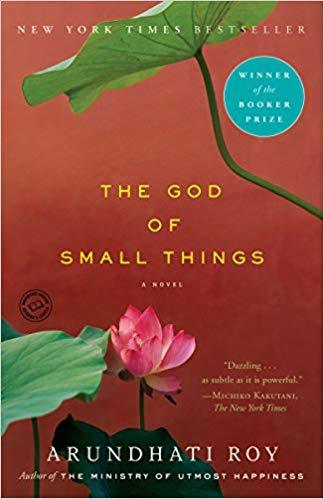
I very much admire the language, which often tastes like the right amount of chili sauce with your favorite food. It gives an additional tinge to the food without killing its real taste. At times, it pushes you to the top of a hill, encouraging you to look down for a surprise in the landscape.
Roy also adds the shortest possible sentences to give depth to what was said. These are like small waves, coming after the main thought, highlighting its intensity and valor: “A limp floorswab, and two rusty tin cans of nothing. They could have been Paradise Pickle products. Pineapple chunks in syrup. Or slices. Pineapple slices.”
Another technique of hers is to use the same meter in a series of sentences describing the same scene. They are like cold waves on a summer day. They keep coming until they touch your feet, and take away some of the harshness of the sun hovering over you on the beach: “In the lobby orangedrinks were waiting. The lemondrinks were waiting. The melting chocolates were waiting. The electric blue foam leather car-sofas were waiting. The Coming Soon! Posters were waiting.”
She often plays a game, with us by unfolding the story slowly to heighten our curiosity, and also with the language, depicting setting and its time in a crispy manner: “The Man wiped his marble counter with a dirt colored rag. And he waited. And waiting he wiped. And wiping he waited. And watched Estha sing.”
Her musical satire does not go unnoticed:
“Bon von Trapp had some questions of his own.
(a) Are they white children?
No. (But Sophie Mol is.)
(b) Do they blow spit bubbles?
Yes. (But Sophie Mol doesn't)
(c) Do they shiver their legs? Like clerks?
Yes. (But Sophie Mol doesn't.)
(d) Have they either or both, ever held strangers' soo-soos?
N . . . Nyes (Sophie Mol hasn't.)
“Then I’m sorry,” Baron von Clapp-Trapp said. “It’s out of the question. I cannot love them. I cannot be their Baba. Oh no.”
Baron von Clapp-Trapp couldn’t.”
And the music she has created in the feelings of her characters: “Estha sat and watched. His stomach heaved. He had a green-wavy, thick-watery, lumpy, seaweedy, floaty, bottomless-bottomful feeling.”
And her similes. Unique: “But Joe was dead now. Killed in a car crash. Dead as a doorknob. A Joe-shaped hole in the Universe.”
This is one of the novels in which you enjoy nuances of language more than the story. The story, though, has its own charm, and every turn makes you look forward to the next one.

I very much admire the language, which often tastes like the right amount of chili sauce with your favorite food. It gives an additional tinge to the food without killing its real taste. At times, it pushes you to the top of a hill, encouraging you to look down for a surprise in the landscape.
Roy also adds the shortest possible sentences to give depth to what was said. These are like small waves, coming after the main thought, highlighting its intensity and valor: “A limp floorswab, and two rusty tin cans of nothing. They could have been Paradise Pickle products. Pineapple chunks in syrup. Or slices. Pineapple slices.”
Another technique of hers is to use the same meter in a series of sentences describing the same scene. They are like cold waves on a summer day. They keep coming until they touch your feet, and take away some of the harshness of the sun hovering over you on the beach: “In the lobby orangedrinks were waiting. The lemondrinks were waiting. The melting chocolates were waiting. The electric blue foam leather car-sofas were waiting. The Coming Soon! Posters were waiting.”
She often plays a game, with us by unfolding the story slowly to heighten our curiosity, and also with the language, depicting setting and its time in a crispy manner: “The Man wiped his marble counter with a dirt colored rag. And he waited. And waiting he wiped. And wiping he waited. And watched Estha sing.”
Her musical satire does not go unnoticed:
“Bon von Trapp had some questions of his own.
(a) Are they white children?
No. (But Sophie Mol is.)
(b) Do they blow spit bubbles?
Yes. (But Sophie Mol doesn't)
(c) Do they shiver their legs? Like clerks?
Yes. (But Sophie Mol doesn't.)
(d) Have they either or both, ever held strangers' soo-soos?
N . . . Nyes (Sophie Mol hasn't.)
“Then I’m sorry,” Baron von Clapp-Trapp said. “It’s out of the question. I cannot love them. I cannot be their Baba. Oh no.”
Baron von Clapp-Trapp couldn’t.”
And the music she has created in the feelings of her characters: “Estha sat and watched. His stomach heaved. He had a green-wavy, thick-watery, lumpy, seaweedy, floaty, bottomless-bottomful feeling.”
And her similes. Unique: “But Joe was dead now. Killed in a car crash. Dead as a doorknob. A Joe-shaped hole in the Universe.”
This is one of the novels in which you enjoy nuances of language more than the story. The story, though, has its own charm, and every turn makes you look forward to the next one.
Published on July 13, 2019 17:18



